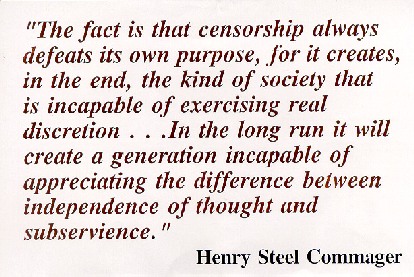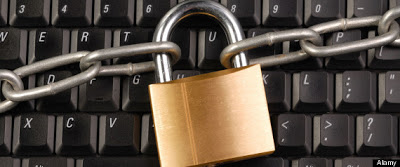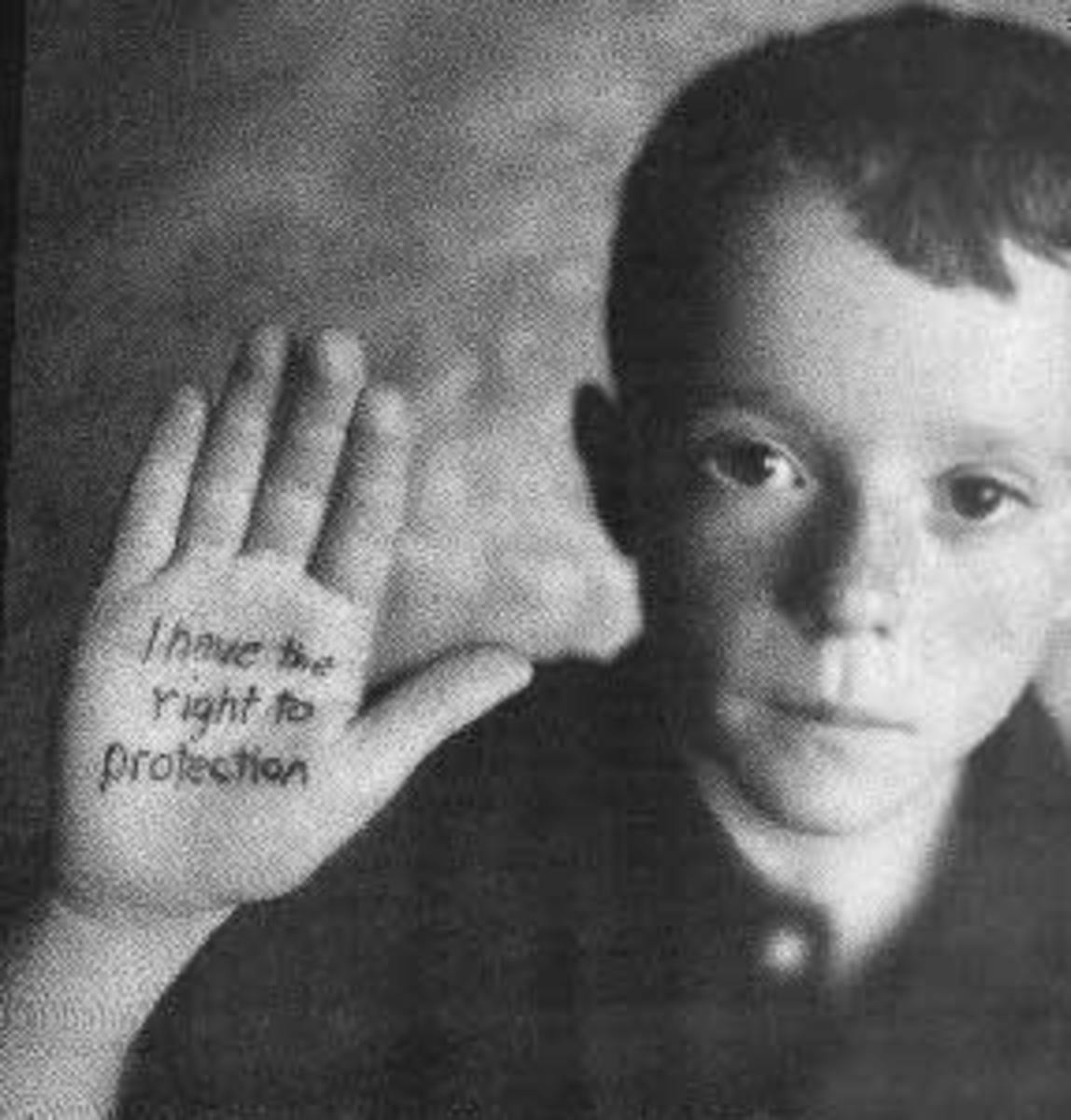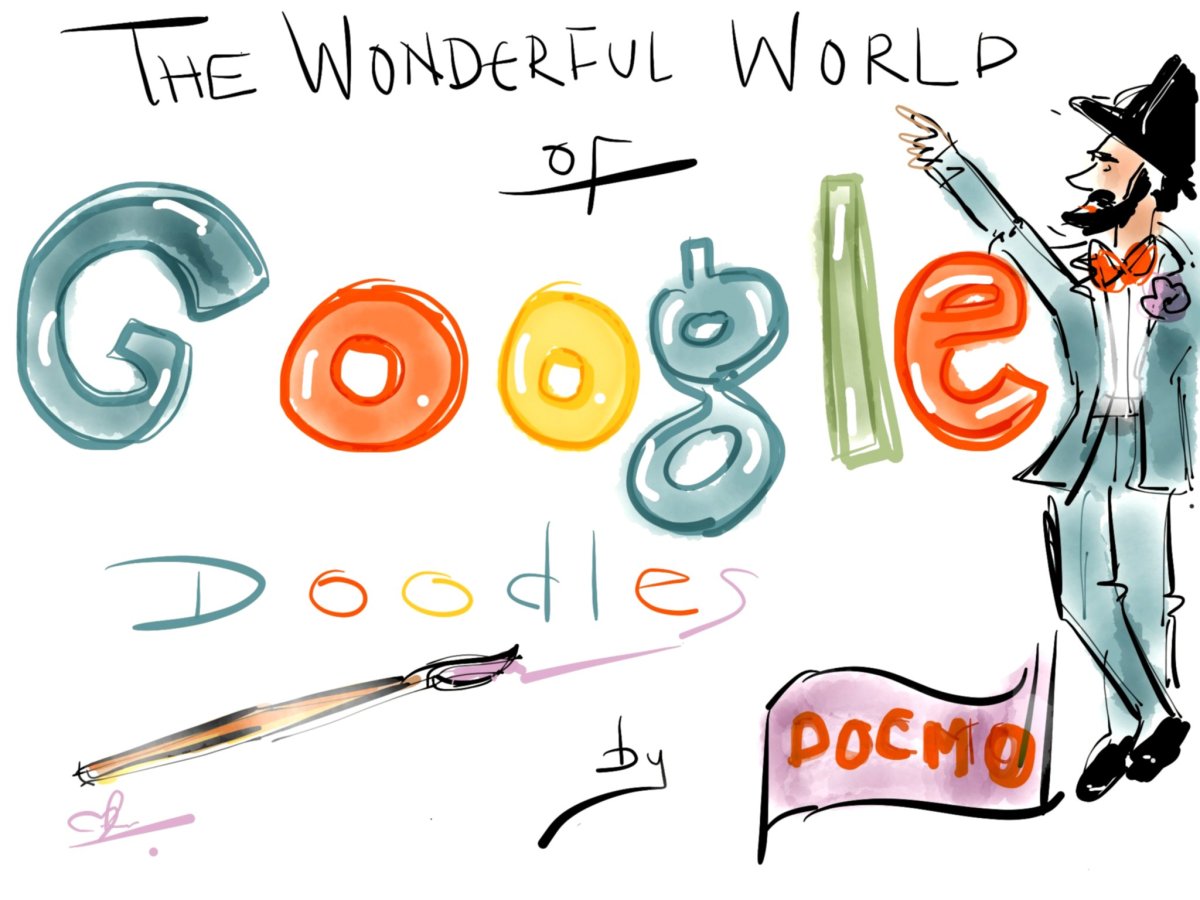Internet Censorship

For about a year I worked as a librarian at a high school. Some of the parents in the community were upset that a few romance paperback books were available to their children to check out at any time. The head librarian decided it best to put these particular paperback books in another room where only adults had access.
After some time, the news of this action was spread. Other parents came and told the librarian that a book they read had some questionable material in it. Soon many more of the books were taken off the shelf to be locked up, too.
Still more parents rebelled against the librarians actions, claiming that if she locked up books which included sex, violence nudity, and the like, she would have to place under lock and key many more books including ones that were required reading for the high school English classes, as well as some religion books, including the Bible.
Government Control over the Internet
The internet has been referred to as The Community Library Learning Center and by others as the Neighborhood porn store.
I would like to submit that censorship of the internet should be done at the user level because of the following reasons:
- Any more government control over the internet will violate the First Amendment rights of every American.
- The internet is global in nature.
- The majority feel that the best control starts at the user level.
- People can be trained to control the internet chaos.
First we will look at the level of current government control over the internet.
We may ask, is the existing legal frame adequate or should it be strengthened.

First, we will look at the level of current government control over the internet.
We may ask, is the existing legal frame adequate or should it be strengthened?
In most cases, existing law is perfectly adequate, just under-enforced. For example, we are aware of no child pornography statute anywhere in the world that is medium dependent. So child pornography online is "automatically" illegal and prosecutable, just as this crime if prosecutable when it is done on paper. The Government can and does punish with criminal sanction people who engage in these forms of speech.
While criminals come online, for criminal purposes, they are often caught, because it is difficult to hide such activity online. The big problem is that thousands of new sites are added daily. The first amendment states, Congress shall make no law abridging the freedom of speech, or of the press.
The Internet is Global
Nearly half of the internet communcations originate outside the United States, and some percentage of that figure represents pornography. Pornography from,say, Amsterdam, will be no less appearling to a child on the internet than pornography from New York City, and residents of Amsterdam have little incentive to comply with our government regulations.
Nicholas Negroponte stated. "It's not that laws aren'ts relevant, it's that the national state is not relevant. Cyberlaw is by nature global and we're not very good at global law."
Two Federal courts ruled in separate decisions that state laws in New York and Georgia restricting speech on the internet are unconstitutional. Judge Preska struck down a New York state net-censorship law saying that a single state couldn't pass laws that apply to the entire internet. She also said it violated the U.S. Constitution's ban on states attempts to regulate commerce outside their borders.

Stephen Bates stated, "But law has always been based on territory. Now, in cyberspacew, we're seeing, in substantial part, the end of geography, and that creates comflex problems."
The mass majority feels that the best control starts at the user level, not with the government. User control is the best way to help parents prevent their kids from accessing inappropriate material on the internet.
Sean Cunningham said "The internet is the last true free marketplace of ideas, whereby anyone from across the globe can share their thoughts on any number of topics. If the American government has the ability to pass a bill restricting one part of the internet, why not then restric certain words, then ideas, and why not people?"
The internet, by cutting across international borders, redefines the concept of national sovereignty. As governments and nations are bombarded with information from different cultures and countries, they are forced to deal with subjects and attitudes that are not their own. Discussions, advertisements, even recipes, for beef will be available over the internet in India, where cows are sacred. Pictures of clothes or naked women, and articles for and about women will be available in Iran where women are still expected to cover their faces from men. Details of abortions and contraceptive services are freely available in Ireland where it is unlawful to have an abortion.
Censorship Breeds Fear, intimidation and Coercion
The U.S. Government and the governments of other countries whow awnt to censor free speech on the internet would serve their citizens better if they promoted a spirit of cooperation for finding solutions to restrict minors from adult material rather than threatening legal acion against their citizens.
The Libertarian Party has much to say about censorship. They feel that the government control is not needed. Parents, not Justice department bureaucrats, should determine what children see, hear, or download. Libertarians are opposed to government censorship in any form: whether it is high-teach cyber-censorship, or old-fashioned book burning.
People Can Be Trained to Control the Chaos
We will look at what steps users (including libraries, schools, universities, and parents) can take in order to reduce the possibilities for children to access pornographic material.
- Educate the children. The best way to keep our kids away from pornograph is to teach them to find it as distasteful as we do. When it comes to morality, there i no substitute for the parent.
- Employ filtering and ratings technology and services. None of it is expensive. You woulnd't leave kids at home with a babysitter, or send them to the city without adult accompaniment, so don't boot them into cyberspace with a virtual chaperone.
- Learn at least the basics of the technology yourself. It is not nearly as mysterious and frightening as some people claim. There are no child pornography networks. Such a thing would be an instant cop magnet and would be shut down immediately.
Parents and educators certainly need to be aware that the internet is not a playground, but more like a city of 30-60 million people or more. One does not let a child run around by him or herself in downtown New York or Paris, and likewise, children need supervision and guidance online.
If not the users, who will be in charge? Who will be in chargge of patrolling the net? How will be abuses be detected? How will they be punished?
Until these questions can be answered, it is interesting to analyse what alternatives are on offer to help users censor the internet themselves.
Conclusion
Because of the global nature of the internet, and lack of appropriate standards with which others will censor what we should or should not see, the majority of Americans feel that training user control is the best way to tame the internet.
Who should censor the internet in your opinion?
© 2013 Elayne









